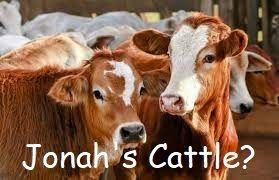The CRCA
Cattle
There’s an interesting line at the end of the story of Jonah that illustrates the wonderful compassion of God. Mind you, many folk dismiss the book of Jonah as a morality lesson that some clever writer put together. Hey, can you really believe a story about a man being swallowed by a huge fish and then spat out on dry land? A friend of mine once commented: I’d believe it even if it said that Jonah swallowed the whale, because it’s in the Bible and the Bible is God’s inspired Word.
Well, right now it’s not my purpose to defend the historicity of the book of Jonah. I just wanted to point out that when Jonah went to Nineveh to proclaim God’s judgment against an evil city their king called on his people to repent. He decreed, “Let neither man nor beast, herd nor flock taste anything... and let them call out mightily to God.” Well the story relates how God showed mercy to the city of Nineveh and did not destroy it. Of course the story also relates how Jonah was displeased with God showing mercy to a nation that was Israel’s enemy. So while Jonah sat waiting hopefully for Nineveh to be destroyed, God taught him a lesson. First God caused a fast growing vine to provide a shelter for him from the hot sun. He then sent a worm to chew through the root of the vine. When Jonah threw a wobbly over the death of the vine God reminded him that he was feeling pity for a mere vine but that He, God, was feeling pity for 120,000 people in the city of Nineveh. And that’s when we get that interesting little addition to the story: “...besides much livestock.”
Okay, so God has compassion on repentant people but also on cattle. Yes, but should that not be entirely expected? According to the Bible God is, after all, the creator of every living thing. So why should He not show compassion to all His creatures? I guess that’s the surprising bit. If God had overthrown Nineveh as He once did Sodom and Gomorrah, it would not only have been livestock that would have perished along with the humans. The rats and cats would also have perished in the overthrow. So would the dogs and the frogs. So does God not care about them... only the livestock? Well, Jesus said that not even a sparrow can fall to the ground without our heavenly Father’s permission, so there’s certainly a sense in which God cares about all His creatures.
But I think there are some reasons why livestock are especially singled out. They have a special relationship with human beings. Not only has mankind domesticated these creatures but we also rely on them in many ways. Dairy cows for milk; beef cattle for protein; sheep for wool; cattle for leather; to say nothing of their labours for mankind, for example, oxen pulling a plough or a wagon. The lives of humans are inextricably bound up with cattle... so in His compassion for cattle the Lord God is indirectly also showing His care for us humans who are so dependent on them.
But perhaps there is another reason why cattle are added as objects of God’s special care in the story of God’s pardoning of the city of Nineveh. It’s interesting that in Old Testament times these animals also played a huge role in Biblical religion. Sheep, goats and cattle were slaughtered and burnt on an altar to atone for the sins of human beings. These creatures had come to share in the sad consequences of human rebellion against God. They too took their place in a fallen and broken world. But God also appointed them to foreshadow the saving work of the Lord Jesus Christ. Every animal sacrifice in Old Testament times pointed to the dying of the Lord. In a sense they were a very appropriate sacrifice. A creature that is sinful cannot pay for the sins of others, he’s got his own sins to atone for. Animals are innocent... so the innocent dies in place of the guilty. That’s a great picture of the innocent Christ dying for guilty sinners.
Of course the people in Nineveh would not have understood this, but then the book of Jonah was not written to inspire the Assyrians living in the days of Jonah. The book was written to teach some lessons to God’s people, Israel. And it was written so that we today might know God as a compassionate God who also had a special concern for the animals that were being used to foreshadow the saving work of His Son.
John Westendorp
When you subscribe to the blog, we will send you an e-mail when there are new updates on the site so you wouldn't miss them.



Comments